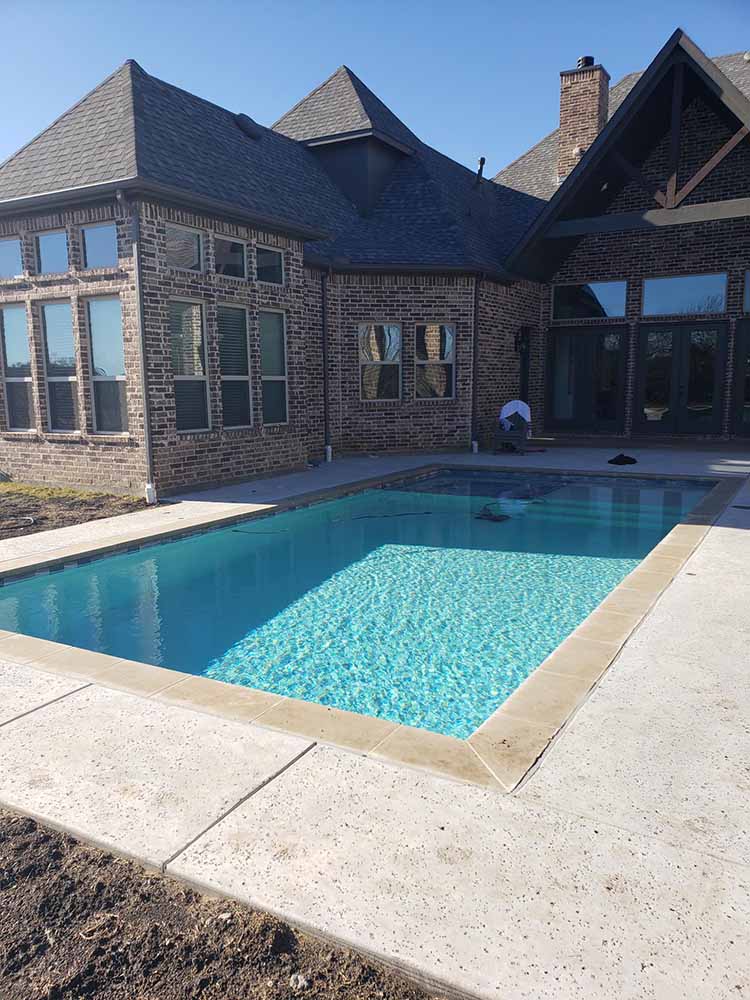When designing pool shapes, there are several things to consider: maintenance and cleaning, sunlight exposure, construction and labor, and aesthetics. While a free-form shaped pool will make your backyard stand out from others, sometimes a rectangular shaped pool provides many benefits that you aren’t even aware of.
Here are the main differences between rectangular and free-form shaped pools that will help you choose the right pool for your backyard.

Rectangular Pools
Pros:
- More common than free-form pools.
- Rectangular pools cost less to install than free-form pools.
Cons:
- Rectangular pools are not as natural-looking as free-form pools.
- Rectangular pools can look smaller than they are because of their shape.
Large rectangular pools are often used for lap swimming, while smaller ones can be used for family recreation or just lounging in a beautiful backyard. These pools are typically larger than their free-form counterparts, which means you’ll need a bigger backyard to accommodate the pool and any necessary landscaping.
With the proper planning and design, however, a rectangular pool can create a gorgeous centerpiece for your yard that will be the envy of all your neighbors.
Free-Form Pools
Pros:
- Free-form pools are more customizable.
- Offers flexibility for games and various activities.
- Better fit for backyards of all shapes and sizes.
Cons:
- More expensive than rectangular pools due to the added construction costs of forming the rockscape.
- Unnatural look. If you’re looking for the most natural-looking pool possible, this isn’t it!
The main benefit of free-form pools is that they’re highly customizable. You can add waterfalls, grottos, caves, and other features to make your pool as fun or relaxing as you like. Free-form pools can fit into just about any backyard space, unlike their rectangular counterparts that require more space to install.
On the downside, free-form pools tend to cost more than rectangular pools due to their intricate designs and added features. They can also be harder to maintain since they often include water features such as fountains, slides, and waterfalls.
Size Considerations
The size of your backyard will likely be the biggest deciding factor in what type of pool you choose. Free-form pools are typically much larger and can take up more space than rectangular pools, so they need a fairly large yard to fit comfortably. If you only have a small space, rectangular pools may be a better choice because they can be installed on almost any size property.
Budget Considerations
Free-form pools are more expensive than rectangular pools because they take longer to build. A rectangular pool is more simple and more straightforward to build, but free-form pools can be more complicated. They tend to feature all kinds of twists and curves in unique, creative designs, which makes them more expensive.
A good rule of thumb is that free-form pools are about 10% more expensive than standard pools.
Which is Best for Your Backyard?
When you’re planning to build a pool in your backyard, one of the first questions you’ll need to answer is what shape you want your new pool to be. You have a lot of options, but most pools can be divided into two categories: rectangular and free-form. Each of these types has its own unique advantages and disadvantages.
However, if you want to find out more about either of these two very different types of pools before making your purchase decision, we’re here to help. Contact us at Texas Outdoor Oasis so we can talk about your pool options with you!
By: Texas Outdoor Oasis
Title: Rectangular vs Free-Form: Which Pool is Best for your Backyard?
Sourced From: texasoutdooroasis.com/rectangular-vs-free-form-which-pool-is-best-for-your-backyard/
Published Date: Thu, 27 Oct 2022 22:26:55 +0000
--------------------------------------------------
 Backyard GrillingWeekend WarriorsAdvice from DadBeard GroomingTV Shows for Guys4x4 Off-Road CarsMens FashionSports NewsAncient Archeology World NewsPrivacy PolicyTerms And Conditions
Backyard GrillingWeekend WarriorsAdvice from DadBeard GroomingTV Shows for Guys4x4 Off-Road CarsMens FashionSports NewsAncient Archeology World NewsPrivacy PolicyTerms And Conditions
